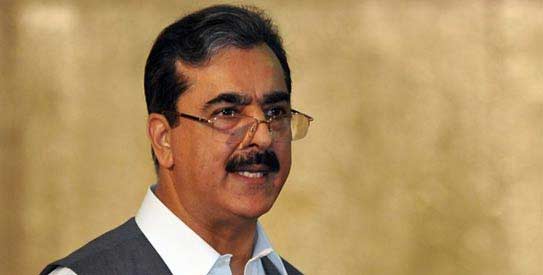
ISLAMABAD: In what was seen here as yet another backtracking, Prime Minister Yousuf Raza Gilani said on Wednesday that his remarks about replies filed in the Supreme Court in the memo case were not against the army chief and the director general of ISI.
“The remarks were made in a different context,” the prime minister said, adding that the remarks on that occasion had been made in a unique situation when things were overlapping and there was no clarity.
“But since (then) there is clarity and now we have all met and that (remark) does not pertain to these two gentlemen (Gen Ashfaq Kayani and Lt-Gen Shuja Pasha),” he was quoted as saying by the official media before his departure for Davos to attend the World Economic Forum scheduled for Jan 25-29.
In an interview with the People’s Daily Online of China, Prime Minister Gilani had said that affidavits submitted to the apex court by COAS Gen Ashfaq Parvez Kayani and ISI chief Lt-Gen Ahmad Shuja Pasha on ‘memogate’ were “unconstitutional and illegal” because they had not sought approval of the competent authority under the rules of business.
But on Wednesday Gilani said: “Later when we found out some of the discrepancies made by certain functionaries, I have taken action against them; now it does not pertain to those remarks unconstitutional or against the rules for the army chief and the ISI director general.”
Further clarifying the remarks which had created a sort of crisis situation in the country, he said: “There were a lot of events taking place and there was overlapping by lot of government functionaries on many issues, and I said in that context.”
Asked if his statement had anything to do with his Tuesday’s meeting with Gen Kayani and Lt-Gen Pasha, the prime minister said: “The comprehensive meeting was purely focused on the security situation of the country vis-à-vis Afghanistan.”
However, he said: “The country cannot work in an atmosphere of confrontation among state institutions. Therefore, in the national interest we have to be on the same page.”
The statement indicates that the mending of ties between civil and military leaders was a result of a series of meetings leading the last one on Tuesday. Political observers see the statement as an effort to defuse tensions between the government and the armed forces.
This is not the first time the prime minister has reversed himself on his verbal attacks on the military establishment.
He had earlier withdrawn his January 9 statement that there should be “no state within a state”, saying it wasn’t aimed at the army but at the defence secretary who had not shared the replies of the COAS and the ISI DG with the government.
In a hard-hitting speech in National Assembly on January 9, Gilani pointedly questioned the presence Osama bin Laden in the country and asked who had given him visa, apparently a slight on the army’s performance.
President Asif Zardari later said in a TV interview that the prime minister’s comments were aimed at former president Gen (retd) Pervez Musharraf, and not at the incumbent army chief.
Only this week when reporters asked the prime minister about the army’s demand that he must take back his statement about their affidavits submitted to the apex court, Mr Gilani said: “I am only responsible to parliament and not to an individual.”
A PPP leader said recent meetings between the army leadership and President Zardari had resulted in the thawing of relations between the two sides. “Yes, it’s quite obvious. During Tuesday’s meeting it was decided that Prime Minister Gilani would issue this (latest) statement.”













































Dear visitor, the comments section is undergoing an overhaul and will return soon.